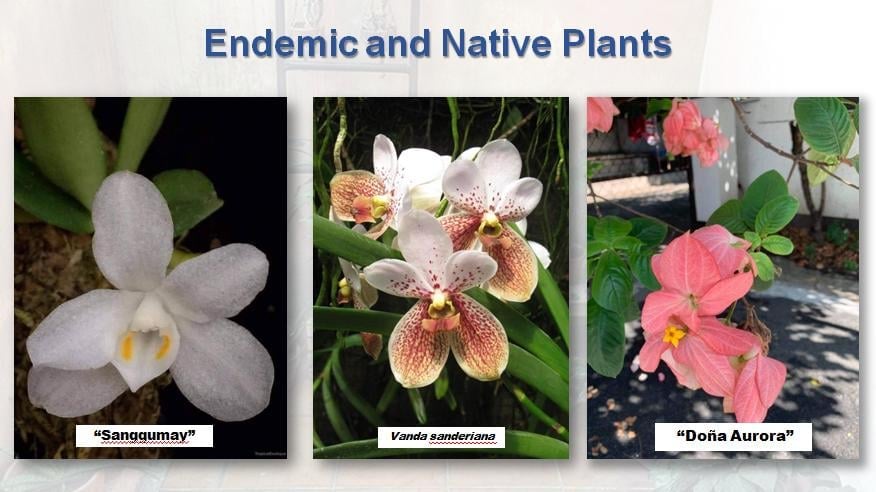
November 29, 2020 Sunday

Sanggumay orchids, Waling-waling (Vanda sanderiana), and Doña Aurora are among the endemic and native plants here in the Philippines. Photo from the presentation of ASEAN Centre for Biodiversity Executive Director Dr. Theresa Mundita Lim.
MANILA, 30 November 2020 — Plant experts gathered virtually to underscore the importance of responsible gardening brought by the rising trend of collecting ornamental plants, and the possible environmental consequences and dangers of inaccurate wild plant harvesting to Philippine forests and biodiversity during the 27th episode of “Stories for a Better Normal: Pandemic and Climate Change Pathways” with the topic, “Plant Wise: Responsible Gardening.”
The online conversation hosted by Deputy Speaker Loren Legarda featured Dr. Theresa Mundita Lim, Executive Director of the ASEAN Centre for Biodiversity; Dr. Ireneo Lit Jr., entomologist, and curator of the University of the Philippines Los Baños (UPLB) Museum of Natural History; and Dr. Gideon Lasco, a medical anthropologist from the University of the Philippines Diliman and a research fellow at the Ateneo de Manila Development Studies Program;
Dr. Lasco shared the intricate relationship of humans with plants, highlighting that people have allowed plants to take deeper root, occupying a big part of their daily routines and living spaces.
“Plants also serve as links to the past: plants are “portable trees” that humans can carry along with them in their life journeys, from house to house, from generation to generation. At a time when our very vitality seems imperiled by a deadly pandemic, plants offer an alternate vision of life: one of growth and germination. However, it remains to be seen if this will translate to environmental awareness and action,” said Dr. Lasco.
Dr. Lim discussed the value of planting and growing endemic and native species and the dangers of a thriving plant economy, and showed different over-collected endemic native plant species.
“Dahil sa pagtaas ng mga presyo ng halaman, dumadami ang pumupunta sa mga bundok para manguha ng mga halaman sa ating mga kagubatan. Ang hindi nakikita ng mga tao ay yung ating mga forests ay hindi lang isang klase, 10 types ‘yan. Tumaas ang poaching, sa iba't ibang mga forests ay binubunot ang mga halaman tapos ay ibinibenta. Ang Pilipinas, mataas ang endemicity o yung sinasabing mga halaman na nakikita lang dito sa Pilipinas,” said by Dr. Lim.
Dr. Lit introduced the different invasive non-native species of plants, their negative effects on other plants and the environment, and the proper ways to handle and take care of them.
“Ang pag-aalaga ng halaman ay katulad ng pag-aalaga ng “pets” o alagang aso o pusa. Dapat responsable tayo. Yung aso, hindi inaalpasan kapag nagsawa ka na o hindi mo na kayang alagaan. Ganun din ang mga halaman, babantayan natin,” said by Dr. Lit.
In the episode, Legarda said that due to the community quarantine, many Filipinos have turned to ornamental plant gardening as a way to cope with stress and uncertainty. However, the global and local circulation of plants comes with a significant ecological footprint, and so do all the materials used to tend to them like plastic pots, pesticides, packages used for transport, among others.
“While ornamental plant gardening makes coping with the pandemic a little easier for many people, it is also important to be aware of the threats it poses to the environment, including plant poaching, wildlife trading, and unbridled profiteering,” she added.
“Gardening ornamental plants come with the responsibility of practicing sustainable ways of tending them and making sure that the habitats where they are sourced remain unharmed, so as to not disturb ecosystems that are unique to the Philippines,” Legarda concluded.
As an online discussion to promote health, environmental consciousness, and climate-adaptive practices, "Stories for a Better Normal" aims to change the mindset of individuals, families, and communities by demonstrating ways in which a ‘better normal’ can be realized within our communities.
This online discussion is organized in partnership between the Office of Deputy Speaker Legarda and the Climate Change Commission, with support from the Institute for Climate and Sustainable Cities, The Climate Reality Project-Philippines and Mother Earth Foundation.